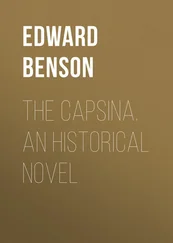Edward Benson - Arundel
Здесь есть возможность читать онлайн «Edward Benson - Arundel» — ознакомительный отрывок электронной книги совершенно бесплатно, а после прочтения отрывка купить полную версию. В некоторых случаях можно слушать аудио, скачать через торрент в формате fb2 и присутствует краткое содержание. Жанр: foreign_prose, на английском языке. Описание произведения, (предисловие) а так же отзывы посетителей доступны на портале библиотеки ЛибКат.
- Название:Arundel
- Автор:
- Жанр:
- Год:неизвестен
- ISBN:нет данных
- Рейтинг книги:4 / 5. Голосов: 1
-
Избранное:Добавить в избранное
- Отзывы:
-
Ваша оценка:
- 80
- 1
- 2
- 3
- 4
- 5
Arundel: краткое содержание, описание и аннотация
Предлагаем к чтению аннотацию, описание, краткое содержание или предисловие (зависит от того, что написал сам автор книги «Arundel»). Если вы не нашли необходимую информацию о книге — напишите в комментариях, мы постараемся отыскать её.
Arundel — читать онлайн ознакомительный отрывок
Ниже представлен текст книги, разбитый по страницам. Система сохранения места последней прочитанной страницы, позволяет с удобством читать онлайн бесплатно книгу «Arundel», без необходимости каждый раз заново искать на чём Вы остановились. Поставьте закладку, и сможете в любой момент перейти на страницу, на которой закончили чтение.
Интервал:
Закладка:
Like an obsession this sense of revelation ready to show itself to her, could she but put herself on the plane of thought where it lay, besieged her all day, and as they returned to the caravanserai at the foot of the pass as the sun, declining behind the western hills, turned them for a moment into glowing amber, it seemed to elude her but by a hair's-breadth. There all was ready for the reception of the caravan that had marched through the pass into India that day; the sellers of bread were pulling out of their circular ovens excavated in the ground the flat cakes of unleavened bread, the brass samovars hissed at the booths of the tea-sellers, and cauldrons of hot soup boiled and bubbled. Already the van of the wayfarers was entering the guarded gates that were pierced in the mud walls, and the camels, weary with the long stage, bent their unwieldy joints and lay down for their drivers to strip off their load. Some were too tired to eat, and, resting their queer prehistoric heads on their bended forelegs, closed their long-lashed eyes and slept. Others, hungry and restless, foamed and lathered and snapped greedily at the mounds of dried fodder that their drivers placed before them. Tired men got their bowls of soup or tea from the stalls, and, leaning against the sides of their beasts, ate their supper, and wrapping their heads in their dusty gay-coloured shawls, slept by their sleeping animals. Others, inclined for a chat, collected round the shops of the provision-sellers against the wall of the serai, and smoked and talked when their supper was done; others, three or four clubbing together, lit fires of the brushwood they had gathered during the day, and cooked their own food at cheaper rate than obtained in the stores. Ponies nickered and twitched at their heel-ropes, the sharp, pungent smell of the wood fires and the wreaths of aromatic smoke drifted slowly along the sluggish currents of the almost windless air, and gradually the empty space of the serai became a mosaic of sleeping men and beasts. The hills that the sunset had turned into molten tawny gold grew dark again with the gathering night, and in the depth of the velvet vault above the wheeling stars grew large.
And behind all the various forms of life, behind the molten hills, behind the sky, behind the limbs of the bearded camels, behind the chatter and smoke of the provision booths, there lurked, so it seemed to Elizabeth, one impulse, one energy common to all. In her head lay some remembered melody of Schumann, that seemed to beat to the same indwelling rhythms to which the stars pulsated.
Her father was standing alone beside her; a little way off the genial Commander-in-Chief was tasting the soup that bubbled in the tin-plated cauldrons, pronouncing it excellent, and bidding his aide-de-camp, a slim young, weary Englishman, translate his verdict of it to the gratified booth-keeper. Some word of the identity of this great boisterous hedonist had been passed about the serai, but the tired drovers of the caravan paid little heed. And yet, here incarnate, was the figure-head of the English power that guaranteed their safe journey through the turbulent lands of the frontier, and that would avenge with wicked little spitting guns and a troop of khaki-clad soldiers any raid that the ungoverned tribe might make. But Sir Henry, in spite of this, roused but little attention; the tired drovers slept; those who were more alert were but employed with jokes and snatches of song round the samovars and soup-cauldrons. The hills and the stars attended as little; everything and everybody was intent on his own inward calls, just as last night the Brahmin who lay by the wayside had no need of food, and but thought of the finding of that for which all his years had searched.
And then Elizabeth's questing soul suddenly gave up the pursuit of a hidden cause, and felt content with the obvious explanation. She took her father's arm.
"Oh, daddy, I've had such a lovely day!" she said. "What heaps of different things there are in the world, and what heaps of different businesses. And it all makes such a jumbled incoherent whole! In half an hour we shall be back home again, and it will be time to dress, and mamma will tell us all she has done to-day. After dinner I will play the piano to you till you snore, and as soon as you snore I shall wake you up again and make you write to Aunt Julia to say when I shall arrive at Heathmoor."
He pressed her hand as it lay in the crook of his arm.
"It is a less tragic view than that of last night," he said.
"I know. At this moment I don't mind the least about going to England. I'm – I'm going to take things as they come."
Elizabeth paused a moment, as with the vividness of ocular hallucination the Brahmin's face once more swam before her eyes.
"But that doesn't mean I am not going to be serious," she said. "I want 'richly to enjoy.' Doesn't that come in the Bible somewhere? I expect there are many routes that arrive at the same place."
To anybody unacquainted with the sum of Elizabeth's musings that day, this was necessarily a cryptic speech. It grew more cryptic yet.
"Perhaps drink leads the drunkard there," she said, "and music the musician. Doesn't one develop, daddy, through one's passions, and not through one's renunciations? I can't see how starving your desires can possibly help one."
"My dear, there are desires and desires," he said.
"And where do they all come from? Surely from the search."
He was silent a moment, and at that moment anything short of enthusiastic acceptance of her illumination was a coldness, a hand of ice to Elizabeth.
"Daddy, you don't understand," she said. "As long as we want, it doesn't much matter what we want. Isn't it half the battle to be eager?"
He shook his head.
"Again I should talk nonsense if I agreed with you," he said. "Eagerness is a sword, my dear; but it is not armour."
"I don't want armour," she said quickly. "I am not afraid of being hurt."
"Ah, don't get hurt, my darling!" he said.
"Not I. And if I do get hurt, daddy, I shall come crying to you, and you will have to comfort me. Oh, oh – look at all those tired men, with no beds to lie on, and no pillows and no tooth powder or sponges! Don't you envy them? They will wake up in the morning, and find themselves there, and, after all, nothing else can matter. I don't want to be bothered with possessions. I want to be – " Elizabeth suddenly broke off, interrupting her speech and thought alike.
"Daddy, that darling Sir Henry has had soup, and now he is eating unleavened cakes, and a peculiarly murderous-looking Pathan is tempting him with a pomegranate. Do stop him; he is dining with us in an hour's time, and mamma will be so vexed if he doesn't eat the most enormous dinner."
Colonel Fanshawe, with Elizabeth still on his arm, stepped over a couple of sleeping prostrate forms.
"Yes, we will go to him," he said, "and you shall tell me more about the simple life afterwards. It is getting late."
Sir Henry had just cracked a pomegranate in his enormous beefy hands.
"God bless me!" he was saying. "I never saw anything look so good. Fanshawe, be kind enough to tell this man in your best Pushtoo, that there's a fortune in pomegranates. Why, it's quite delicious; never tasted such a fine fruit."
Colonel Fanshawe made some amiable equivalent of all this in Pushtoo, and spoke to Sir Henry again.
"He says that his trees will bear in greater abundance than ever now, sir. But it is rather late. I think we ought to be getting home. You won't have more than time to eat your dinner in comfort before the train – "
Sir Henry rejected a mass of seeds.
"Yes, yes; we'll go," he said. "Why, here's my Miss Elizabeth come to insist. I always obey the ladies, Colonel; you obey the ladies always, and you'll have a confoundedly pleasant time. Now, Miss Elizabeth, quick march, is it?"
Читать дальшеИнтервал:
Закладка:
Похожие книги на «Arundel»
Представляем Вашему вниманию похожие книги на «Arundel» списком для выбора. Мы отобрали схожую по названию и смыслу литературу в надежде предоставить читателям больше вариантов отыскать новые, интересные, ещё непрочитанные произведения.
Обсуждение, отзывы о книге «Arundel» и просто собственные мнения читателей. Оставьте ваши комментарии, напишите, что Вы думаете о произведении, его смысле или главных героях. Укажите что конкретно понравилось, а что нет, и почему Вы так считаете.











